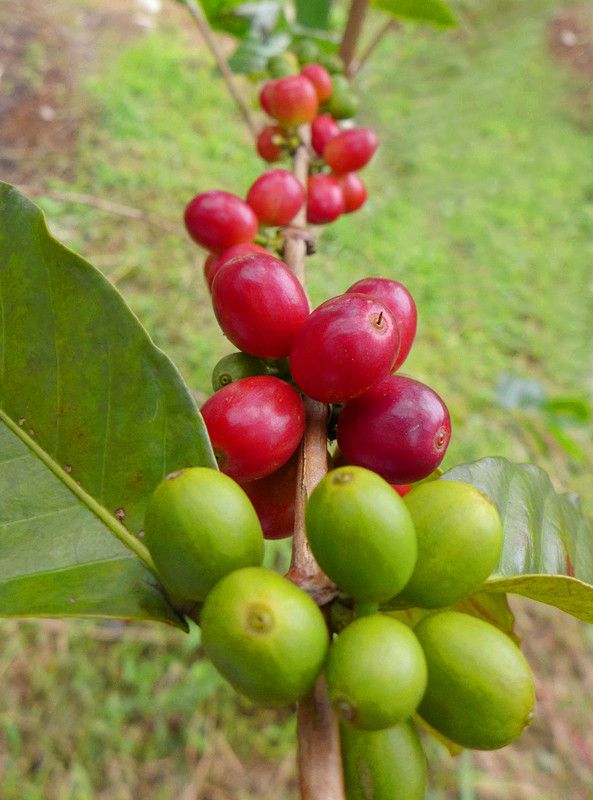Taste and flavor of Kenyan PB coffee characteristics of Kenyan PB

Professional barista communication, please pay attention to coffee workshop (Weixin Official Accounts cafe_style )
Factory Name: Coffee Workshop Address: No. 10, Baoan Qianjie, Yuexiu District, Guangzhou City Contact: 020-38364473 Shelf life: 90 Net content: 227g Packing method: Bulk coffee beans Ripe degree: Coffee ripe beans sugar: sugar-free Origin: Kenya Roasting degree: Mild roasting
Kenya Nyeri Gaturiri Peaberry
Country: Kenya
Grade: TOP PB
Region: Nyeri
Degree of baking: Light baking
Treatment method: washing
Varieties: SL 28, SL 34
Treatment plant: Chackney Treatment Plant
Flavor: Black plum, green grape, small tomato
Kenya Nyeri Thagrini Peaberry Farm Profile
Bourbon descendants selected and cultivated by French and British missionaries and researchers in Kenya in the early 20th century. For centuries, Kenya has adapted to high concentrations of phosphoric acid soil, breeding Kenya bean special sour fragrance spirit, different from the Bourbon bean in Central and South America. This Kenyan native species was created in 1930 by Scott Laboratories and is known simply as SL. Agronomists wanted to find a pest-resistant and high-yield bourbon, and they got SL28 through experiments. SL28 is a genetic variant with a mixed lineage of French missionaries, mocha and Yemeni tibica. SL28 was originally bred to produce high-quality and disease-resistant coffee beans in large quantities. Although SL28 did not yield as much as expected, the copper-leaf color and broad bean-like beans had great sweetness, balance and complexity, as well as notable citrus and dark plum characters. This important variety introduces us to the unique Kenyan style: intense and rich acidity, rich taste and beautiful balance. Kenya AA is one of them.
SL28 is a delicious variety, suitable for planting in the middle and high altitude areas where leaf rust is not serious. It can produce 1.8 tons of green beans per hectare. Only when you drink the acid and charming plum fruit flavor can you reflect Kenya's national treasure.
Kenya AA, which is well known to many people, is the most common symbol of Kenya coffee in China. In fact, AA is a grade of Kenya coffee, AB is lower than it, and AA+ and AA TOP are above it. If only the coffee beans are labeled AA, it generally only means that the coffee is AA grade, there is no specific farm or cooperative, the flavor may not be the best, it can only mean that its bean shape is neat to the standard, and it sells well. However, if there is a specific farm or cooperative or even a buyer written on the label, then this bean, whether AA or AB, is worth a try.
Kenya, located in East Africa, is one of the major coffee producing countries, with more than six million people engaged in the coffee industry, mostly in the form of a combination of small farmers and cooperatives. Coffee trees in Kenya are mostly planted at an altitude of 1400 - 2000 meters, and their growth areas include Ruiri, Thika, Kirinyaga, Mt. Kenya West, Nyeri, Kiambu and Muranga. It is dominated by the foothills of Mt.Kenya and Aberdare. In Kenya there are many growing regions that strive to preserve native forest ecosystems, protect natural gene pools, support the reproduction of wild coffee varieties, and breed diverse coffee trees.
Production area:
The green beans come from the Chakni processing plant in Neri and are grown on a nearby family farm, with about 250 coffee trees planted on 0.5 acres. Neri has always been a classic coffee producing area in Kenya. Relying on Mount Kenya, Neri has a superior environment suitable for coffee growth. Kenya coffee comes mostly from small-scale farmers, about 65 per cent, and large-scale farms, about 35 per cent.
Flavor: Classic Kenyan flavor, rich, high body, caramel, blackcurrant, apple, pure, long finish full of tropical fruits and fresh citrus aromas, fresh sweet taste like mango, plum and other preserved fruit in the mouth, medium and low temperature exudes a refreshing smell of lime, like drinking frozen fruit tea! Very small tomato flavor with personality! Full of African beans with a passionate flavor!
Now I want to introduce PB full name Peaberry, that is, we often say round beans, usually a coffee fruit has two seeds, is our common coffee beans, one side is curved, one side is flat, similar to the shape of peanuts, we call it flat beans; Round beans are only one coffee bean in a coffee fruit, the shape of the beans is elliptical, in the whole coffee tree fruit, the proportion is very small. Round beans are manually selected one by one, the overall quality is guaranteed, so it is not surprising that the taste is good.
Hand-washed Kenya. 15g powder, medium fineness grinding (small Fuji ghost tooth knife 3.5 grinding), v60 filter cup, 91-93 ℃ water temperature, the first injection of 30g water volume, 27 seconds stewing, injection to 105g water volume cut off water, wait for the powder bed water volume to drop to half, then slowly inject water until 225g water volume, the tail section does not, water powder ratio 1:15, extraction time 2:00
Important Notice :
前街咖啡 FrontStreet Coffee has moved to new addredd:
FrontStreet Coffee Address: 315,Donghua East Road,GuangZhou
Tel:020 38364473
- Prev

Kenya PB Coffee hand data how to drink Kenya PB
For the exchange of professional baristas, please follow the coffee workshop (Wechat official account cafe_style) Kenya Nyeri Thagrini Peaberry farm introduction French and British missionaries and researchers sifted in Kenya at the beginning of the 20th century.
- Next

Characteristics of Kenyan PB coffee beans Kenyan PB coffee drinking method
Professional baristas please pay attention to the coffee workshop (Wechat official account cafe_style) now I would like to introduce to you the full name Peaberry of PB, that is, round beans, usually with two seeds in a coffee fruit, that is, our common coffee beans, which are curved on one side and flat on the other, similar to the shape of peanuts, which we call flat beans; round beans are in a coffee fruit.
Related
- Detailed explanation of Jadeite planting Land in Panamanian Jadeite Manor introduction to the grading system of Jadeite competitive bidding, Red bid, Green bid and Rose Summer
- Story of Coffee planting in Brenka region of Costa Rica Stonehenge Manor anaerobic heavy honey treatment of flavor mouth
- What's on the barrel of Blue Mountain Coffee beans?
- Can American coffee also pull flowers? How to use hot American style to pull out a good-looking pattern?
- Can you make a cold extract with coffee beans? What is the right proportion for cold-extracted coffee formula?
- Indonesian PWN Gold Mandrine Coffee Origin Features Flavor How to Chong? Mandolin coffee is American.
- A brief introduction to the flavor characteristics of Brazilian yellow bourbon coffee beans
- What is the effect of different water quality on the flavor of cold-extracted coffee? What kind of water is best for brewing coffee?
- Why do you think of Rose Summer whenever you mention Panamanian coffee?
- Introduction to the characteristics of authentic blue mountain coffee bean producing areas? What is the CIB Coffee Authority in Jamaica?

